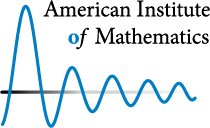
at the
American Institute of Mathematics, Palo Alto, California
organized by
Benjamin Hutz, Patrick Ingram, Sarah Koch, and Tom Tucker
This workshop, sponsored by AIM and the NSF, will be devoted to questions relating to postcritically finite (PCF) rational maps.
The main topics for this workshop are:
A major goal in the fields of complex and arithmetic dynamics is to understand the dynamical moduli spaces that parameterize families of maps. For example, the space of rational maps of degree $d$ modulo conjugation by Möbius transformations $\mathrm{M}_d:=\mathrm{Rat}_d/\mathrm{Aut}(\mathbb{P}^1)$. The global dynamical behavior of a rational map $F:\mathbb{P}^1\to\mathbb{P}^1$ is governed by the forward orbits of the critical points (the points at which the derivative of $F$ vanishes). Imposing the condition that all critical points have finite forward orbits has strong dynamical consequences. The family of PCF conjugacy classes in ${\mathrm M}_d$ plays a role akin to that of $\overline{\mathbb{Q}}$ in $\mathbb{C}$. In the moduli space of quadratic polynomials, the PCF family is dense in the boundary of the Mandelbrot Set. In general, the PCF locus in the moduli space of dynamical systems is not well understood, and questions surrounding its geometry is a topic of current research.
To every postcritically finite rational map, we associate a ramification portrait , a finite directed graph encoding the action of $F$ restricted to its critical and postcritical sets. It follows from one of W. Thurston's important theorems that for a given ramification portrait (which is not of Lattès type), there are at most finitely many conjugacy classes in $\mathrm{M}_d$ which realize it. This phenomenon is known as Thurston rigidity . The statement of Thurston rigidity also has various algebraic incarnations, which are rather strong. It is tantalizing that no algebraic proof of this statement is known (except in special cases).
The workshop will differ from typical conferences in some regards. Participants will be invited to suggest open problems and questions before the workshop begins, and these will be posted on the workshop website. These include specific problems on which there is hope of making some progress during the workshop, as well as more ambitious problems which may influence the future activity of the field. Lectures at the workshop will be focused on familiarizing the participants with the background material leading up to specific problems, and the schedule will include discussion and parallel working sessions.
The deadline to apply for support to participate in this workshop has passed.
For more information email workshops@aimath.org
Plain text announcement or brief announcement.
Go to the
American Institute of Mathematics.
Go to the
list of upcoming workshops.